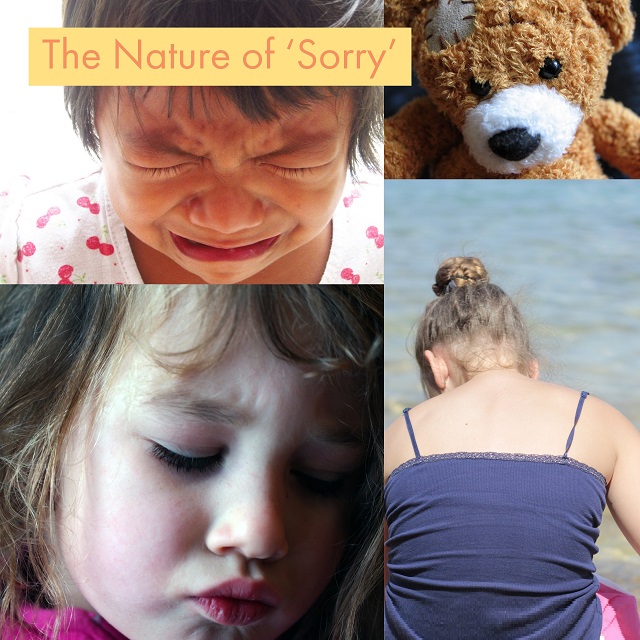The Nature of Sorry by Dewaine Wakeman I was a shy kid in school - very low self-esteem, therefore I was usually the first one to act out in class, and the first one to say sorry to the teacher when my misgivings were discovered. Most of the time the sorrys were well warranted - I could be a real brat. But sometimes I would say sorry for things that weren't much of a big deal at all: like being in someone's way. I remember saying sorry one day to my fourth grade teacher, for something very much non-criminal in his view, and he yelled back at me, "Stop saying you're sorry all the time, If you do it again, you're in the corner for doing it." I remember my sad and comical reply to his retort, "I'm sorry Mr. Torkelson, for saying 'SORRY' to you so much!" It was double detention time for me at that point. Down came the yardstick on his desk. He took me aside, my recess time was shot! And, he was so peeved. I remember it well! And it was so irritating for him as a teacher to hear me say, 'sorry' (again and again) 'sorry' (again and again). So I got to thinking about the nature of sorry. That though it was important to say to others on a regular basis, that we truly are sorry for how we have wronged them, many times it is unneeded and impractical. How sometimes it can even be hurtful to use the word sorry. How it only deepens the wound, and widens the memory of how the other person was hurt by us, or how the other party might chose to use the word sorry, to question our sincerity for example. As a kid, moreover, I can remember my Mom and Dad fighting to a froth on most trivial matters (in a given day). But my Dad was always the first to come out and say, "Sorry Honey." For the way in which he carried on the argument to begin with, it didn't exactly make the sorry anymore welcome, or received for that matter, by my Mom. Sometimes I have learned that even while we are sincere, people may not even still believe we are sorry anyway. Also, sorry can make a victim out of us as well. People who are manipulative, may have noticed our vulnerabilities in an apology. They may now seek to use our apologies wide open against us, rather than for us. Who is to know who is exactly as fault, if these tactics get taken too far? Then, if we apologize, rather than making it all seem better, it can fuel the bitterness, rather than end it. Thankfully, I do not have any of these people as my friends. But I have seen this so-called behavior in, "human beings" as well. No real love here either. Revenge and coldness is what they seek, trying to wear down the apologizer's will to hurt him or her and damage their self-esteem. There is black karma here too, as well, to anyone involved in this dominant/submissive relationship. Steer clear and take the higher ground. Look for a new, and better relationship. Manipulation is the most destructive of all qualities in a spouse. Through our apology in this case, they have chosen to abuse us. These people may not be the best spouses to expose yourself to. or for that matter, demonstrate your sorriness for your behaviors. So, in retrospect, and in many cases: is sorry really that important to hear from someone? Like one old wise saying goes, (and I believe it to be true in most cases) "Love is never having to say you are sorry" (at all). I have enough faith in my partner, that they would never intentionally hurt me in the long-term, or cause me to suffer low self-esteem. This would be the trust I would have in them, before committing to a long-term relationship with them, or even a marriage. It is pretty much how it has to be, in order for the couple to get along, and to build mutual trust and respect. If sorrys were to be offered, they would be sincere in nature, with the power to heal, rather than destroy, both by the giver and the receiver or the apology.
"Lifestyles of the Poor and Broke" by Dewaine Wakeman Thrift – its amazing what you can do. Internet? (We all can do that.) Exercise? (We all can do that too. Who needs a health club membership?) Transportation (We all can do that - several ways) Shelter (We all can find our means I suppose if we are smart about it.) We can have everything a responsible adult can have or a homeless person could enjoy if we are careful, this is still America after all. So who am I? I’m many of you. I’m your neighbor. Won’t you be my neighbor? I’m really good at getting by. Let’s start with exercise: Bicycle or walk? ( no gasoline or auto insurance needed) Cutting firewood (no fuel bills – fire up the wood stove, campfires work too if you live in the deep south). Entertainment? There’s digital televison, you either get the signal or you won't. Btw it’s crystal clear nowadays should you be lucky enough to...




Comments
Post a Comment